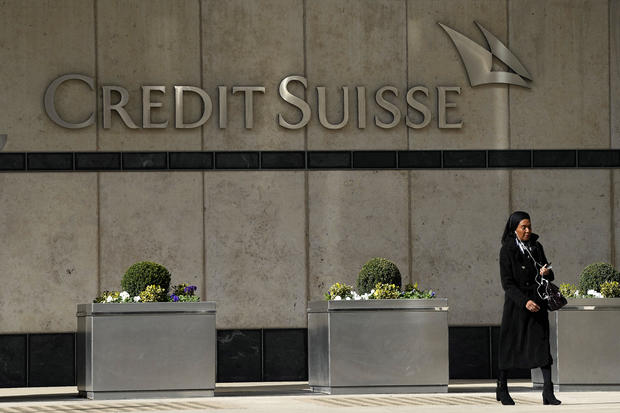UBS to purchase Credit Suisse amid fallout from U.S. bank collapses
The banking giant UBS has agreed to purchase Credit Suisse, a smaller rival, Swiss authorities announced on Sunday. The historic deal comes as major financial institutions continue to grapple with the fallout from the sudden collapse of Silicon Valley Bank earlier this month, and work to stave off a broader crisis.
"This takeover was made possible with the support of the Swiss federal government, the Swiss Financial Market Supervisory Authority FINMA and the Swiss National Bank," the Swiss National Bank said in a statement. "With the takeover of Credit Suisse by UBS, a solution has been found to secure financial stability and protect the Swiss economy in this exceptional situation."
UBS will buy Credit Suisse for more than $3 billion, Credit Suisse said in a news release detailing the purchase, which is expected to be completed by the end of 2023. All of the bank's current shareholders will receive one share of UBS for around 22 1/2 shares of Credit Suisse, according to the release.
In a statement, Axel P. Lehmann, the chairman of Credit Suisse's board of directors, said "the announced merger represents the best available outcome," citing "recent extraordinary and unprecedented circumstances."
"This has been an extremely challenging time for Credit Suisse and while the team has worked tirelessly to address many significant legacy issues and execute on its new strategy, we are forced to reach a solution today that provides a durable outcome," Lehmann's added.
At a news conference held Sunday afternoon to discuss the emergency purchase, Karin Keller-Sutter, president of FINMA, said "Switzerland has to take responsibilities beyond its own borders," and added that the deal was reached in an effort to avoid "irreparable economic turmoil in Switzerland and throughout the world." Keller-Sutter said the purchase "laid the foundations for greater stability both in Switzerland and internationally."
Fears about the stability of the global banking system spread across the U.S. and Europe in the wake of Silicon Valley Bank and Signature Bank's failures, which happened less than two weeks ago ago and within days of each other. Their closures prompted rare moves by the federal government as well as some of the largest U.S. banks to shore up finances at institutions that became threatened in the turmoil.
Credit Suisse received almost $54 billion last week from the Swiss national bank as part of those negotiations, while a consortium of 11 massive U.S. banks, including Bank of America, Citigroup, JPMorgan Chase and Wells Fargo, agreed to provide $30 billion in funding for First Republic Bank. Those four banks each agreed to contribute $5 billion, while Goldman Sachs and Morgan Stanley each agreed to give $2.5 billion and BNY Mellon, PNC Bank, State Street, Truist and U.S. Bank each agreed to give $1 billion.
The pledges of emergency funding on Thursday briefly interrupted what had been ongoing downturns in both banks' stocks, which resumed the following day. On Friday, Credit Suisse's share price slipped 7% and ended the day at $2.01.
For Credit Suisse, Switzerland's second-largest commercial bank, shares dropped 30% on the SIX stock exchange after its largest shareholder said it would not put any more money into the institution. The bank had faced problems before the U.S. banks' failures gave rise to fear and a lack of confidence among big investors, and it announced its plans to borrow up to 50 billion francs from the national bank on Thursday.
"This additional liquidity would support Credit Suisse's core businesses and clients as Credit Suisse takes the necessary steps to create a simpler and more focused bank built around client needs," said Credit Suisse in a statement at the time.
The steep drop-off in its share prices one day earlier marked a record-low for Credit Suisse, after the Saudi National Bank told news outlets that it would not inject additional funds into the institution as it sought to avoid regulations that would become applicable with a stake in the Swiss lender above 10%. That upheaval caused an automatic freeze in trading of shares of Credit Suisse on the Swiss market and significantly impacted shares of other large European banks, with some share prices falling by double-digits.
Despite the Swiss national bank's move to shore up finances at Credit Suisse, analysts at Capital Economics said concerns remained about the health of the institution, especially since it has not been profitable in two years.
Andrew Kenningham, the chief Europe economist at Capital Economics, said in an investor note on Friday that, while Credit Suisse has a plan to restore business over the course of three years, "it is uncertain whether markets will give it that long."






